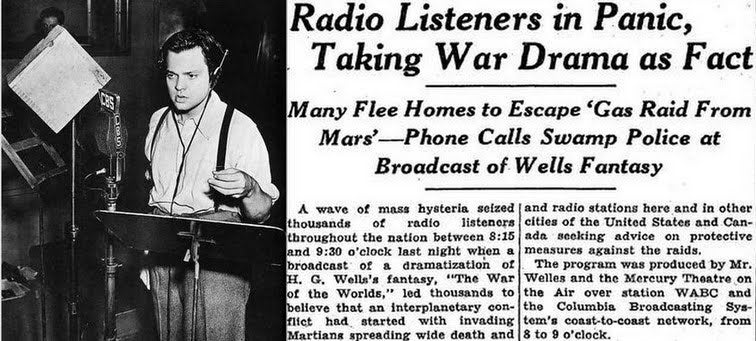
The story of how 23-year-old theatre prodigy Orson Welles frightened American radio audiences with his realistic dramatization of The War of the Worlds has long since passed into folklore, but how did Welles himself feel about that story?
Although media historians have questioned the actual extent and degree of “mass panic” that may have taken place – arguing that much of it may have been exaggerated by newspaper editors eager to score points against the rival medium of radio – it is certain that the broadcast alarmed a significant number of people.
Some listeners, their anxieties already heightened by daily news reports concerning the march of German soldiers through Europe, may have misheard the word “Martian” as “Nazi” and thereby became convinced that the US was under attack by the Axis powers. Others simply tuned in part-way through the broadcast, missing the announcement that it was a work of fiction. There were also unfortunate co-incidences, such as a total power black-out in the town of Concrete, Washington, which interrupted the local broadcast at a crucial moment and left listeners literally in the dark and imagining the worst.
The immediate aftermath included a genuine invasion of CBS’ Madison Avenue radio studio by scowling police officers, who confiscated scripts and sternly interviewed Welles but could not figure out whether any laws had actually been broken. There were also dire threats of censure or even legal action from the FCC.
The day after the War of the Worlds broadcast, Welles himself held a press conference, which is shown below. On the face of it, he was the picture of earnest contrition as he gravely fielded questions from newspaper and radio journalists:
The subsequent scandal (and intense media exposure) did no harm at all to Welles’ career, and within a few short years he had transitioned to Hollywood and directed his cinematic masterpiece, Citizen Kane.
By 1955, with his Martians receding into popular memory, Welles allowed himself some considerable, if understated, relish in relating several amusing and colorful anecdotes about the invasion panic. He also offered the “confession” that his adaptation of War of the Worlds was not quite as innocent as he had previously claimed:
And in a 1975 interview with Tom Snyder, Welles further admitted, with regards to his 1938 press conference appearance:
There are pictures of me made about three hours after the broadcast looking as much as I could like an early Christian saint. As if I didn’t know what I was doing … but I’m afraid it was about as hypocritical as anyone could possibly get!
Note – an earlier version of the above article originally appeared on the Past Tense blog. It is re-used here by permission.
